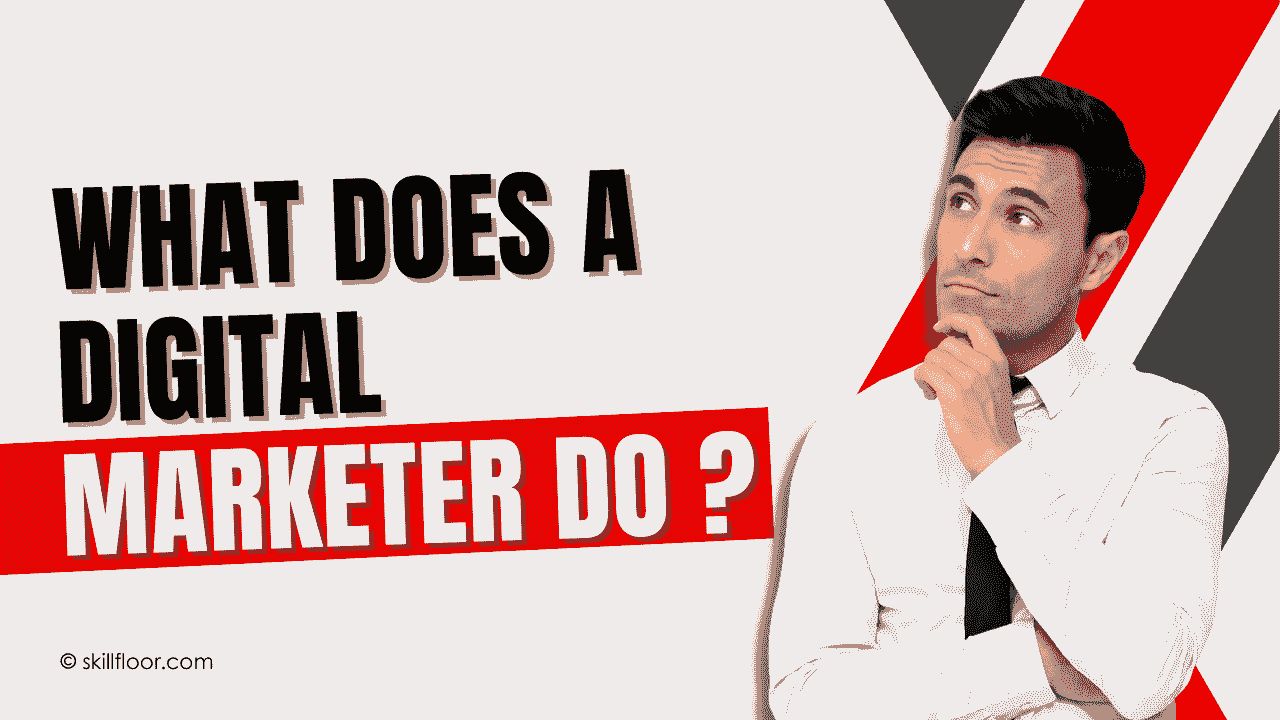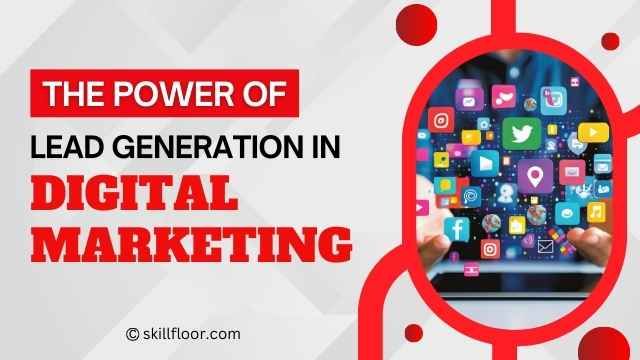What Does a Digital Marketer Do?
what a digital marketer does, from strategy and content creation to SEO and data analysis. Learn about the skills and career paths in digital marketing.

As a digital marketing expert with years of experience, I frequently get asked a straightforward yet delicate question: What does a digital marketer do? Digital marketing is constantly changing because of new technologies, platforms, and shifts in how people use the internet. This makes understanding the role of a digital marketer both interesting and challenging. Let’s break it down in simple terms.
The Increasing Demand for Digital Marketing
Digital marketing has become important in recent years. Businesses of all sizes know they need a strong online presence to stay ahead. From big companies to small local shops, everyone wants to grab the attention of people who use the internet.
Today, digital marketers do more than just manage social media or run ads online. We are like strategic planners, creative problem solvers, and data experts all rolled into one. Our job is to connect with customers in meaningful ways on different digital platforms.
Understanding the Multifaceted Role of a Digital Marketer
Understanding what a digital marketer does can be tricky because the job involves many different tasks. Unlike traditional marketing roles that might focus on just one medium, like print ads or TV commercials, digital marketing covers a wide range of online platforms and techniques. It’s not only about knowing how to use Facebook or Google Ads but also about figuring out how all these tools work together to create a successful marketing plan.
This can be even more challenging because the digital world changes quickly. Algorithms update, new tools come out, and people’s online behaviors change. What worked last year might not work this year. So, as digital marketers, we need to be flexible, keep learning, and adjust our strategies to stay effective.
What Does a Digital Marketer Do?
What does a digital marketer do? The role can vary widely depending on the industry, company size, and specific job title. However, it generally involves:
1. Strategy Development
At the heart of digital marketing is strategy. Every campaign starts with a clear, well-thought-out plan. As a digital marketer, one of my primary responsibilities is to develop strategies that align with the business goals. This involves:
-
Market Research: Understanding the target audience, their needs, preferences, and behaviors. This might involve analyzing customer data, studying competitors, and staying up-to-date with market trends.
-
Goal Setting: Defining what success looks like. Whether it’s increasing brand awareness, driving website traffic, generating leads, or boosting sales, clear goals guide the entire strategy.
-
Channel Selection: Deciding which digital channels (e.g., social media, email, search engines, content marketing) will be most effective in reaching the target audience and achieving the goals.
-
Budget Allocation: Determining how much to spend on each channel and tactic, ensuring that the budget is used efficiently to maximize ROI.
2. Content Creation and Management
Content is the backbone of digital marketing. It’s how we communicate with our audience, convey our brand message, and provide value. As a digital marketer, I spend a significant amount of time on content creation and management. This includes:
-
Copywriting: Writing compelling and persuasive content for various platforms—whether it’s a blog post, social media update, email, or ad copy. Good copy is essential for engaging the audience and driving action.
-
Visual Content: Creating or coordinating the production of visual content, such as graphics, videos, and infographics. Visual content is often more engaging and shareable, making it a crucial part of any digital strategy.
-
Content Strategy: Planning the types of content that will be created, how often it will be published, and on which platforms. A well-structured content calendar ensures that content is consistent and aligned with overall marketing goals.
-
SEO Optimization: Ensuring that content is optimized for search engines. This involves using the right keywords, structuring content effectively, and making sure that technical SEO aspects (like meta tags and page speed) are in place.
3. Social Media Management
Social media is a powerful tool for building brand awareness, engaging with customers, and driving traffic. Managing social media accounts is a key part of my job as a digital marketer. This involves:
-
Platform Strategy: Understanding which platforms are most relevant to the target audience and tailoring the approach accordingly. Each platform—be it Facebook, Instagram, LinkedIn, or Twitter—requires a unique strategy.
-
Content Creation: Developing content specifically for social media, which is often more interactive and immediate. This might include posts, stories, videos, and live broadcasts.
-
Community Management: Engaging with followers, responding to comments and messages, and building a loyal community around the brand. Social media is all about two-way communication, and managing this dialogue effectively is crucial.
-
Paid Social Advertising: Running paid campaigns on social media platforms to increase reach and engagement. This involves targeting specific demographics, testing different ad creatives, and optimizing campaigns based on performance data.
4. Search Engine Optimization (SEO) and Search Engine Marketing (SEM)
SEO and SEM are critical components of digital marketing. They ensure that when potential customers search for relevant keywords, they find the company’s content. Here’s how I approach these areas:
-
Keyword Research: Identifying the keywords that potential customers are using to find products or services similar to what the company offers. This research informs both SEO and SEM strategies.
-
On-Page SEO: Optimizing individual web pages to rank higher in search engine results. This includes optimizing content, meta tags, headings, and images, as well as ensuring the site is mobile-friendly and loads quickly.
-
Off-Page SEO: Building the site’s authority through link-building strategies, such as guest blogging, partnerships, and social sharing.
-
PPC (Pay-Per-Click) Advertising: Managing paid search campaigns on platforms like Google Ads. This involves bidding on keywords, creating ads, and optimizing campaigns to achieve the best possible ROI.
5. Email Marketing
Email remains one of the most effective digital marketing channels, particularly for nurturing leads and building customer relationships. My responsibilities in email marketing include:
-
Campaign Strategy: Planning email marketing campaigns that align with broader marketing goals. This could include newsletters, promotional emails, and automated email sequences.
-
List Segmentation: Dividing the email list into segments based on customer behavior, preferences, and demographics. This allows for more personalized and effective email marketing.
-
Automation: Setting up automated email sequences, such as welcome series, cart abandonment emails, and post-purchase follow-ups. Automation ensures that the right messages reach the right people at the right time.
-
Performance Analysis: Tracking key metrics like open rates, click-through rates, and conversions. Analyzing this data helps refine the strategy and improve future campaigns.
6. Data Analysis and Reporting
In digital marketing, data is king. Everything we do is measured, analyzed, and optimized based on performance data. As a digital marketer, I rely heavily on data to inform decisions and demonstrate the impact of our efforts. This involves:
-
Analytics Tools: Using tools like Google Analytics, social media analytics, and CRM systems to track performance across all digital channels.
-
Performance Metrics: Monitoring metrics such as traffic, engagement, conversion rates, and ROI. These metrics help us understand what’s working and where improvements are needed.
-
A/B Testing: Running experiments to test different versions of ads, landing pages, emails, etc., to see which performs better. This iterative approach helps optimize campaigns for better results.
-
Reporting: Creating reports that communicate the results of digital marketing efforts to stakeholders. These reports often include insights and recommendations for future strategies.
what are the skills need digital marketers?

1. Creativity: Essential for crafting compelling content and designing innovative marketing campaigns that capture attention and drive engagement. This includes the ability to generate new ideas and present them in ways that resonate with the target audience.
2. Analytical Skills: Crucial for interpreting data from various sources, such as website analytics and social media metrics. This skill involves assessing performance metrics to make data-driven decisions, optimizing campaigns, and understanding what strategies are most effective.
3. Technical Skills: Proficiency with a range of digital marketing tools and platforms is vital. This includes:
-
SEO Tools: Understanding tools like Google Analytics and SEMrush to enhance search engine rankings.
-
Social Media Platforms: Creating advertising and analytics tools on platforms like Facebook, Instagram, and LinkedIn.
-
Email Marketing: Utilizing software such as Mailchimp or HubSpot for creating and managing email campaigns.
4. Project Management: The ability to plan, execute, and oversee marketing projects from inception to completion. This involves setting timelines, managing resources, coordinating with team members, and ensuring that projects are delivered on schedule and within budget.
5. Communication Skills: Strong written and verbal communication skills are important for creating clear, persuasive content and effectively interacting with clients, colleagues, and stakeholders. This includes the ability to articulate marketing strategies and results.
6. Strategic Thinking: Developing long-term marketing strategies that align with business objectives and adapting them as needed based on industry trends and changes. This skill involves planning and executing campaigns that contribute to overall business growth and success.
These core skills enable digital marketers to effectively navigate the complexities of the field, create impactful marketing strategies, and drive meaningful results for their businesses or clients.
The Typical Career Progression for Digital Marketers
1. Entry-Level Roles:
Digital Marketing Assistant/Coordinator: Support day-to-day tasks, such as content creation, social media management, and basic data analysis. Gain foundational experience and learn the tools of the trade.
2. Mid-Level Positions:
-
Digital Marketing Specialist: Focus on specific areas like SEO, PPC, or social media. Develop and implement strategies, manage campaigns, and analyze performance.
-
Digital Marketing Manager: Oversee a team, manage marketing campaigns, and coordinate between different departments. Focus on strategic planning and execution.
3. Senior-Level Roles:
-
Digital Marketing Director: Set overall marketing strategy, lead a larger team, and manage budgets. Drive high-level initiatives and ensure alignment with business goals.
-
Head of Digital Marketing/Chief Marketing Officer (CMO): Lead the entire marketing department, define the company's digital marketing vision, and make executive decisions to guide the company’s marketing efforts.
4. Specialized Roles:
-
SEO Specialist/Manager: Specialize in optimizing website content to improve search engine rankings.
-
PPC Specialist/Manager: Focus on creating and managing pay-per-click advertising campaigns.
-
Content Marketing Specialist/Manager: Concentrate on developing and executing content strategies to engage and convert audiences.
5. Consulting and Entrepreneurship:
-
Digital Marketing Consultant: Provide expert advice to businesses on digital marketing strategies and tactics.
-
Marketing Entrepreneur: Start your own digital marketing agency or business, applying your expertise to a range of clients and projects.
This progression outlines a path from gaining foundational skills to leading marketing efforts and potentially branching into specialized or entrepreneurial roles.
Being a digital marketer involves much more than just posting on social media or running ads online. It’s a diverse job that includes creating strategies, producing content, managing social media, optimizing for search engines, running paid ads, handling email campaigns, analyzing data, and constantly learning.
As I’ve worked in this field, I’ve realized that success requires a mix of creativity, analytical skills, and flexibility. The job keeps you on your toes with new trends and ideas, and it’s all about achieving real results. Whether you’re starting or aiming to move up, digital marketing offers many ways to grow and make a difference.






























































